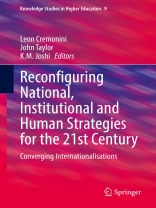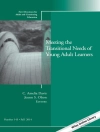This book addresses policies and strategies on internationalization across very different higher education systems globally, including inter alia from South America, Asia and Africa. The volume zooms in on the interplay between the national, institutional and “human” levels of internationalization. The latter is especially novel in that it pays particular attention to how internationalization shapes individuals – rather than only to the effects on student learning or research productivity. The work expounds on (a) the role of internationalization in fostering ethical forms of integration and preparing citizens to engage in dialogue across those differences, (b) the possible trade-offs between private benefits and negative social effects, and (c) the contribution of internationalization to a
“global community of minds
”. By discussing the human dimension, it becomes clear how internationalization can contribute to defining unique ways to confront today’s societal challenges. Moreover, as the world is facing unprecedented challenges in the wake of the coronavirus, a specific chapter examines how the pandemic has made diversity among different student groups more explicit and what implications this holds for the globalisation of higher education. A range of methodologies was adopted, including qualitative (case studies and interviews) and quantitative (e.g. surveys). The book draws on both strategic frameworks and research projects to provide new perspectives on how internationalization plays out, especially linking strategies with human impacts.
สารบัญ
Introduction: Developments in Internationalisation in the 21st Century.- Chapter 1. Greek HEIs in the ERA: Internationalized research and national development – the role of the University.- Chapter 2: Internationalisation at Home: Critical Analysis of Challenges, Tensions and Obstacles in Finnish Higher Education.- Chapter 3: The State and its Role in the Internationalization Process of Higher Education in Argentina and the Reaction to Covid-19.- Chapter 4. Internationalization of Higher Education in India: Deliberations on the Rationale, Strategies, Readiness and Impact.- Chapter 5: Regional Universities around the World: An Analysis of Single Campus, Multi-campus and Virtual Models.- Chapter 6: Internationalisation of Finnish Higher Education as a Policy Driver in a Merger Process—Towards Competition, Collaboration, or Sustainability? Chapter 7: University Internationalisation: the impact of the COVIC experience in a global-south university.- Chapter 8: Institutional strategic treatment of internationalisation in Flanders.- Chapter 9: National Strategies of Internationalisation: The Case of Hungary.- Chapter 10: Internationalization and social responsibility in Ethiopian Higher Education.- Chapter 11: Internationalization in increasingly decolonising global south university sectors: a prospective view of opportunities and challenges.- Chapter 12: Ten Facts about Internationalising Higher Education Online: The Good, the Bad and the Ugly?.- Conclusions: Reconfiguring internationalisation in global higher education: converging the nations, the institutions and the humans.
เกี่ยวกับผู้แต่ง
Leon Cremonini is a Senior Policy Officer at the Directorate for Strategy and Policy, University of Twente, the Netherlands. Between March 2018 and November 2019 Leon was the Managing Director of the Ethiopian Institute for Higher Education (EIHE) at Addis Ababa University, Ethiopia (2018-2019), following a 12-year tenure as researcher at the Center for Higher Education Policy Studies (CHEPS), University of Twente. He worked in Europe the United States and Africa, focusing on higher education policy reform in several countries in Africa, the Middle East and Asia. Main areas of expertise include excellence policies, internationalization, quality assessment, university and programme rankings, and equity and access to higher education, particularly for historically disadvantaged populations and refugees. Leon presented papers and published on these topics. He has been a researcher on several European Union-sponsored projects. He has worked as a consultant to the European Union’s delegation to Syria on higher education in emergencies project, and as a consultant for the development of the national strategy for higher education in Ethiopia.
Professor John Taylor has over 20 years of experience as a senior manager in higher education, working at the Universes of Leeds, Sheffield and Southampton before moving into an academic career. As Director of Planning at the University of Southampton, he was responsible for all aspects of strategic and operational planning; as well as management information and resource allocation. He studied national and international trends in higher education, key policy areas such as selectivity in research, broadening access, lifelong learning and diversification of funding. John was involved with all the main policy developments in UK higher education. John moved into an academic career at the University of Bath, then as Professor of Higher Education Management and Policy at the University of Southampton, and as Professor of Higher Education Management and Special Adviser to the Vice-Chancellor, University of Liverpool. He is currently a visiting professor at Lancaster University’s Department of Educational Research. Over the years, John has worked in Australia, South Africa, Croatia, Sweden, Finland, Denmark, Romania, Serbia, Hungary, Russia, Germany, Portugal, Finland, China, Cyprus, Pakistan, Jamaica, Canada, Uruguay and the United States. He also conducted professional development trainings for the European Association for International Education (EAIE). John as conducted comparative studies on strategy and planning; resource allocation (including inter alia marketization and value for money); governance and organizational structures; internationalization and globalization; quality management in higher education; and access and widening participation.
K.M. Joshi is Professor of Economics of Higher Education in the Maharaja Krishnakumarsinhji Bhavnagar University, Bhavnagar, India. K.M. Joshi has been a visiting Professor/researcher at University of Toronto, Central European University, University of Philippines, Mykolas Romeris University, University of Lyon 2, Nagoya University and University of Paris 8. He is recipient of eight distinguished international fellowships including the Ford Foundation’s ‘Asia Fellows’ award and the French ‘Hermes’ fellowship. Dr. Joshi holds Ph.D. in Economics from Saurashtra University, Rajkot, Postgraduate Diploma from ISS, The Hague, Netherlands and postdoctoral from UMR Education and Politiques, Institut National de Recherche Pedagogique, Lyon. He has delivered about 29 keynote addresses in international and national seminars/workshops. His areas of research and specialization are Economics of Higher Education, Higher Education Reforms, Private Higher Education and International Economics. Dr. K.M. Joshi has 9 edited books and more than 47 articles to his credit.












